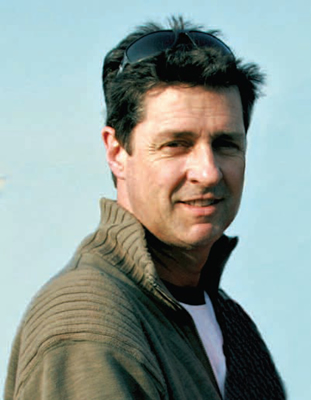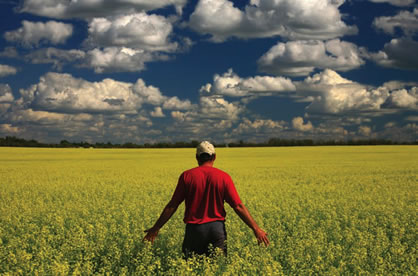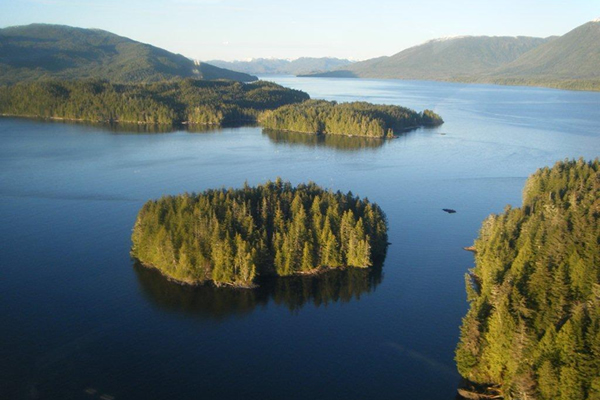Shawn Burns

Most days, Shawn Burns rides his bike to work. It usually takes the Cornell-Queen’s Executive MBA’07 grad around 30 minutes to cycle from his suburban home to his downtown Vancouver office. Not a big deal in Vancouver where many people commute by bike. But where Shawn works, it’s company policy for employees to use bicycles or public transit whenever possible. And that policy starts at the top.
Shawn Burns, the founder and CEO of Carbon Credit Corporation (CCC), is passionate about sustainability. Staff at CCC must be, too, because they all keep detailed records of their carbon and ecological footprints as part of the company’s commitment to minimizing its environmental impact.
“Our little company is one of the greenest smaller medium-sized enterprises in the country,” Shawn says proudly. It’s no idle claim – Shawn can prove it. CCC is the first company in Canada to have its reported greenhouse gas (GHG) emissions inventory registered with The Climate Registry, a non-profit organization that measures, audits and publicly reports GHG emissions.
All this would be wasted effort if Shawn’s company produced widgets in a coal-burning factory. But Carbon Credit Corp is the antithesis of such an operation. It’s a company that helps those who use the land – farmers, foresters, first nations people, nature conservancies, and agribusinesses – implement land-use practices that help reduce global carbon emissions. In doing so, these groups are entitled to carbon credits that can in turn be sold to greenhouse gas polluters. Polluters are either required by regulation to purchase offsets or choose to do so voluntarily. Either way, it is a polluter-pay system that makes it expensive to pollute while providing funding to those engaged in sustainable land-use practices.

“It used to be that a tree only had value if it was cut down and processed into lumber or other wood products. We’re looking at ways of creating an economic value by leaving the trees standing.” Shawn Burns
When a farmer tills soil, for example, greenhouse gases are produced by exposing rotting vegetation beneath the surface. Traditional tillage causes negative effects such as soil compaction, loss of organic matter, degradation of soil aggregates, and the death or disruption of soil microbes and other organisms; all of which can reduce the ability of soil to hold or fix carbon from the atmosphere by up to 75%.
But if a farmer employs a seed drill instead of a plow, the soil isn’t disturbed in the process and very few gases are released. The farmer is entitled to a carbon credit if he or she switches to more sustainable farming practices, but completing the steps to prove and document this can be overwhelming and costly.
Finding a solution to this problem, and a general interest in the business of land-based carbon, propelled Shawn to quit his job at MacDonald Dettwiler & Associates (MDA) and pursue an MBA. He’d worked at MDA on numerous projects, often in developing countries – projects in flood and forest management and tracking climate change using Earth observation satellites. After 15 years, he was ready for a change.
“I wanted to do something meaningful with my life, and an MBA was the vehicle for me to do that,” Shawn explains. “After working on projects in the developing world for more than a decade, I realized there’s a huge role for companies to play in fostering sustainability, and they weren’t doing that. Properly aligned companies that follow the triple bottom line, focussing on sustainability – social, financial and environmental – can be huge agents of change in the world. I wanted to form a company that could be that kind of agent of change.”
After researching MBA options, he chose the Cornell-Queen’s Executive MBA. Not surprisingly, Shawn, a risk-taker, chose a program that had never before been offered. Cornell’s Johnson School of Management and Queen’s School of Business had only recently joined forces to launch an 18-month program that would provide graduates with both a Queen’s and a Cornell MBA. Most importantly to Shawn, the program opened doors to research centres at both institutions, Cornell’s Base of the Pyramid Learning Lab and Queen’s BIOCAP Foundation.
Within a week of starting the program in August of 2005, Shawn had come up with a company name, outlined the business proposition and developed a set of goals. He convinced his teammates to do their Global Business Project on carbon offset opportunities in Brazil, El Salvador and Ecuador. Faculty were equally supportive of Shawn’s business development efforts: Prof. Stuart Hart of Cornell was very encouraging in supporting Shawn’s international project on carbon farming, while QSB Accounting Professor John Moore encouraged Shawn to follow the Certified Management Accounting (CMA) stream of the program.
Shawn continued to research his business while working on his MBA. A grant from the National Research Council of Canada gave him the resources needed to develop a Carbon Credit Asset Management System (CCAMS) that helps agricultural organizations, land owners, and conservation groups measure, track and monetize their carbon offsets in an efficient and cost-effective manner. This web-based data management system enables farmers, for example, to complete an online form that measures their entitlement to carbon credits. Viterra Inc., a global agribusiness headquartered in western Canada, recognized its potential and signed on as a client. Viterra’s customers use the CCAMS to document their carbon credits which are then exchanged for Viterra’s products, such as seeds, fertilizers and the like.
 By the time Shawn graduated with his MBA in May of 2007, he had already incorporated his company and moved its headquarters from his kitchen table to the office it currently occupies in downtown Vancouver. His wife Chrystal was extremely supportive throughout his studies and was inspired by her husband’s experience to pursue a CQ-EMBA herself. She continued her career in finance at Bentall, Canada’s largest real estate investment advisory and services organization, based in Vancouver, and gave birth to the couple’s second child, Zach, just days before the end of classes in Nov. 2009. Classmates Kimyee Lai,Darren Sokoloski and David Summers initially helped get CCC started before moving on to pursue other opportunities.
By the time Shawn graduated with his MBA in May of 2007, he had already incorporated his company and moved its headquarters from his kitchen table to the office it currently occupies in downtown Vancouver. His wife Chrystal was extremely supportive throughout his studies and was inspired by her husband’s experience to pursue a CQ-EMBA herself. She continued her career in finance at Bentall, Canada’s largest real estate investment advisory and services organization, based in Vancouver, and gave birth to the couple’s second child, Zach, just days before the end of classes in Nov. 2009. Classmates Kimyee Lai,Darren Sokoloski and David Summers initially helped get CCC started before moving on to pursue other opportunities.
Today, Carbon Credit Corporation employs ten people and has fulfilled Shawn’s dream of becoming an agent of change. Especially rewarding has been his work with First Nation peoples in the Great Bear Rain Forest of Haida Gwaii (formerly the Queen Charlotte Islands in BC.) “This 6.3 million-hectare area is the largest northern temperate rain forest in the world,” Shawn explains. “We’ve been working with this group for two years, to help develop an ecosystem offset strategy that will replace revenue lost from traditional activities like logging.”
Shawn needs only to point to the success of the Viterra project that produced over 1 million tons of carbon offsets last year. That’s the equivalent of taking 200,000 cars off the road, or offsetting the carbon from 100,000 homes: say, a city about the size of Kingston. He has become a spokesman for the industry, and was featured in a joint CBC/BBC documentary The Carbon Hunters which aired last November.
He credits his MBA with giving him the tools he needed to build a business that combines his passion for the environment with his commitment to becoming an agent of change. “If you can make money and save the planet at the same time, I think you should.”
